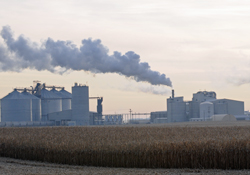Soaking corn kernels instead of drying them could increase ethanol yields and create more co-products.
 Researchers at the University of Illinois have found that a wet ethanol production process results in more gallons of ethanol and more usable co-products.
Researchers at the University of Illinois have found that a wet ethanol production process results in more gallons of ethanol and more usable co-products.
“The conventional ethanol production method has fewer steps, but other than distillers dried grains with soluble, it doesn’t have any other co-products,” said University of Illinois Agricultural Engineer Esha Khullar. “Whereas in both wet and dry fractionation processes, the result is ethanol, distillers dried grains with soluble, as well as germ and fiber. Corn fiber oil for example can be extracted from the fiber and used as heart-healthy additives in buttery spreads that can lower cholesterol.”
In comparing the wet and dry fractionation methods, Khullar’s research team found that when using the wet fractionation method, the result is even higher ethanol concentrations coming out of the fermenter and better quality co-products than the dry method. Researchers say the process requires no new equipment. “It’s just a modification of things that are already being done in the corn processing industry and can be done pretty easily,” Khullar said.

